
"It's such a sad old feeling
The fields are soft and green
It's memories that I'm stealing
But you're innocent when you dream"
I know it's kind of cheeseball to quote Tom Waits as the start of a review, that it smacks of pretentious sincerity, but I couldn't help thinking of "Innocent When You Dream" while watching Gregory Nava's 1983 immigration drama El Norte. I also kept thinking of Madonna's "La Isla Bonita" whenever the main characters talked about their home back in San Pedro, but that's fairly irrelevant. Some songs make you think of movies, some movies make you think of songs.
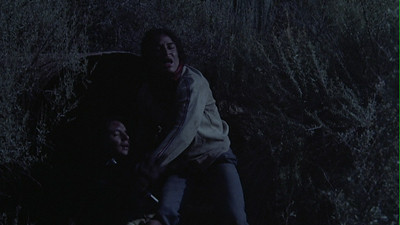
Originally, I had intended to write a bit about the notion of "feel good movies," a label I don't think I've ever used because it has always struck me as pejorative. For a reviewer to toss out that tag, it usually means the movie is mawkish and manipulative, and I was going to suggest that the opposite here is true, that El Norte works as a genuine feel good movie because its sentimentality is heartfelt. The very innocence that fuels the dreams of its protagonists gives the first half of the film a Teflon armor against attacks on its emotion, and so Nava is able to get away with a certain amount of bright-eyed optimism. That is, until the final act, when he yanks the film in the other direction to cause the dream to burst and employs some cliché melodrama straight out of daytime soap operas.
El Norte is broken into three acts: the first act is set in Guatemala, the second in Mexico, and the third in "The North," or "El Norte"--America. The Xuncax family are peasant farmers in San Pedro, though outside forces have taken over their village land and forced all who live there to become laborers. The Xuncax patriarch, Arturo (Ernesto Gomez Cruz), is a fair-minded man who doesn't want his children beholden to the greed of the rich, and so he joins with a couple of other village men to plan some kind of protest. Catching wind of this, the local foreman (Jose Martin Ruano) calls in the army, and all of the co-conspirators are killed. When their mother is taken away by soldiers, along with other relatives of the cabal, the Xuncax children, Enrique (David Villalpando) and Rosa (Zaide Silvia Gutierrez), decide to make a run for America and find new opportunities in the North.

This first takes the pair to Mexico for part 2, where they must find a "coyote"--essentially, someone willing to guide them through the wilderness and across the border. It is here that the innocents start to experience that life beyond their home village is not as kind as it was back there. Both Enrique and Rosa are trusting souls, and thus prey to the opportunistic people who prowl borders towns. They are also smarter than they are given credit for, outwitting con men and immigration officials alike. From their first encounter with the police, Nava uses the language barrier to his advantage, letting English speakers whom the audience understands but whom the characters do not act as illustration of how far the perception of the siblings is from the reality of the situation. The further they get north, the more life becomes a series of business transactions.
But get north they do, and once Enrique and Rosa are settled in Los Angeles, Nava starts showing the day-to-day life of the average illegal immigrant. Enrique sets out to become a day laborer and ends up landing a menial job in a posh restaurant, whereas Rosa starts cleaning houses. They both begin taking ESL classes at public school, one of the many contradictions of life in America. As we well know, most will turn a blind eye to undocumented workers as long as their presence serves a purpose for them. At one point, a jealous co-worker calls immigration on Enrique, and that seems to be the only time the law is really put into effect. Someone has to mention the elephant in the room or it will never be herded out.
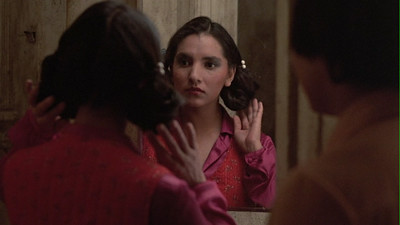
Given what a hot-button debate immigration has been over the last several years, Nava's portrait of two very common, normal, nice people seeking the American Dream is refreshing in its humanism. Political propaganda tends to paint illegals as amoral creatures who'd rather take food off of another man's table than do things the proper way. Nava reminds us that our neighbors to the south are people, too, and they desire the same quality of life that has been part of the myth of the United States since its inception. Compared to where they come from, all of the U.S. is like a magical land for Enrique and Rosa. Their entire preconceived image of this country has come out of Good Housekeeping magazines.
Of course, this image of paradise is a bit off, and Nava gives subtle hints of that early on. In addition to the obvious, like the rundown apartment the kids end up renting or how white society and Mexican society are so clearly demarcated, there are subtle stylistic shifts in El Norte, as well. While in Guatemala, Nava, who co-wrote the screenplay with Anna Thomas, gives the movie small touches of magical realism. These are mainly tied to religion and the prayers both Rosa and her mother (Alicia del Lago) put their full faith in. Religion all but disappears when the kids get to America, as do their ties to the natural world and the land their family has worked with their hands for generations. In this way, Nava is sowing the seeds for the disillusionment of his innocents. During a fever dream when Rosa sees her absent mother, the elder woman points out the truth of the belief that anyone, no matter how poor or how low their class, can make money in America. The catch is that no one ever mentions how expensive it is to live there. It's the hidden costs that will keep her children from rising above their station.
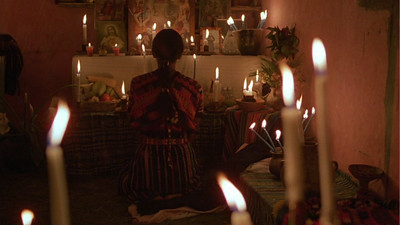
In this simple way, Nava introduces the idea that Rosa and Enrique have paid a higher price than they might have anticipated to live in the land of plenty. Rosa was forced to abandon her sweetheart and the traditional way of doing things, and Enrique has allowed his heart to harden in the endless pursuit of survival. Unfortunately, whatever subtle gloves Nava was wearing up until that point are pulled off, and he applies a heavy hand to the story's dramatic climax. Perhaps all of those badly constructed montages where Nava keeps cutting back and forth between two scenes in a clumsy attempt to trick the audience into thinking one thing is going to happen when it's quite obvious it will not should have been a tip-off that the director is not nearly as facile with certain facets of storytelling language as he should be. To add weight to the last act of the movie, Nava pulls out all the stops to tug at our heartstrings. Will Enrique abandon his sister in her hour of need? Can he ever get back to his roots and the man his father desired him to be? The older man told his son that the rich only see peasants as a pair of arms that can perform the difficult tasks they'd rather not do, and at the end here, wearing the threadbare cowboy hat he had previously put in a drawer the same way he tried to put away his past, Enrique declares that his arms are strong and he is ready to work. He has traveled thousands of miles just to till another man's soil.
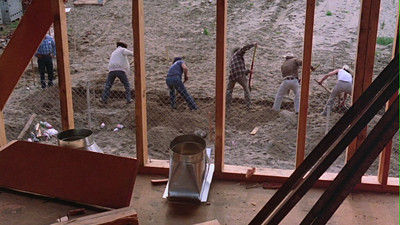
Which would be a poignant ending had Nava not used such worn-out methods to get there. The way he stacks the deck to give the kids their unwinnable final hand isn't necessarily unrealistic--bad things happen to good people, this we know is true--it's just the way he stages it. With the will-he-or-won't-he shots of the airplane on the runway juxtaposed with Rosa in her hospital bed and the exaggerated musical score, he's telegraphing his intentions far too much for the drama to come off as natural. He might as well get on his knees and beg us to cry.
Luckily, Nava's lighter touch bought the director enough good will over the preceding two hours that these final hammer blows are not sufficient to send El Norte completely south. Though I am sure the situation for illegal workers in California has changed quite a bit over the years, both good and bad, I would wager that a lot of the experience is still the same, meaning that the human struggle portrayed here still has resonance. Gregory Nava, like his characters, just got a little too earnest when it came to realizing his own dream, and just as Enrique and Rosa discovered, it's earnestness that causes one to stumble blindly forward into the pitfalls that mark the road to success.

On this two-disc release, Criterion also includes Gregory Nava's 1972 student film The Journal of Diego Rodriguez Silva, which the director says in a new introduction contains the thematic roots for the first act of El Norte. It concerns a fictional Latin American poet who is sent on an existential journey as a result of a civil war in his country. When he is arrested, the jailer who has been ordered to execute him turns out to be a poetry fan, and he sets Silva loose on the condition that he leave the city and never return. From there, the poet undertakes a lonely trek to the house of a friend where he hopes to find solace.
This half-hour, black-and-white film is a meditative piece examining the power of words, the loneliness of exile, and the absurdities of a life thrown into chaos. It is dreamy and quiet, full of chases through maze-like streets and images of dead bodies that recall the narcissistic poet of Cocteau's Orpheus. Though the piece does sort of peter out at the end, it has an effective otherwordly quality that makes it memorable.
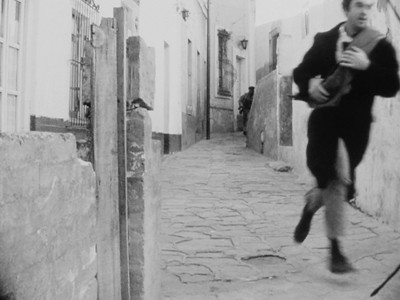

No comments:
Post a Comment